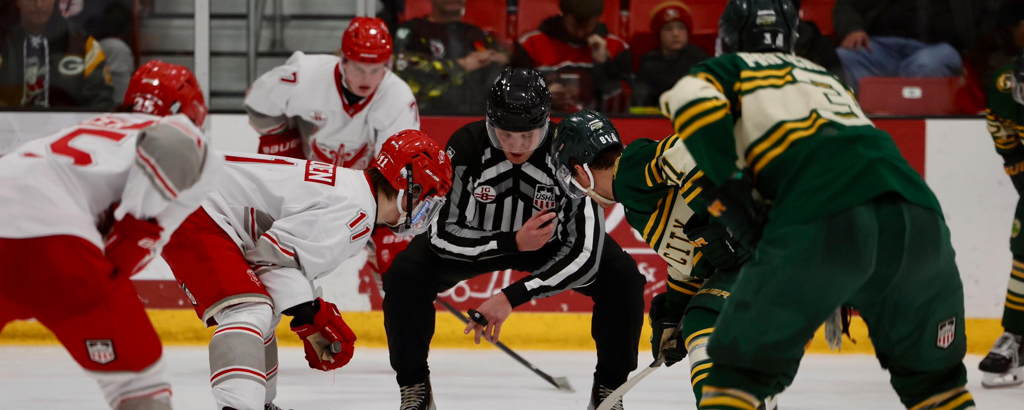NHL Exposure Combine Shifted Ryan Devine’s Perspective from a Player to an Official

Through spending most of his life on the ice, including more than a decade at various professional levels, Ryan Devine knew a lot about a hockey.
He admits that he quickly discovered that he had a lot more to learn after picking up a whistle and donning a striped jersey, though.
Devine’s playing career included stints on more than a dozen teams across the alphabet soup of hockey league abbreviations: the FPHL, SPHL, ECHL, as well as a season in Slovakia. After attending the NHL Exposure Combine in 2024, Devine made the transition from playing to officiating.
The combine is an annual four-day event that exposes players to the world of officiating and is directed at players who have collegiate or other amateur hockey experience. The NHL will host this year’s combine Aug. 14-17 in Buffalo, New York.
“It was a great time,” said Devine, who recently completed his first season as an official in the USHL. “But then I thought, ‘Oh, because I’m a player, I should be doing pro right away.’ And boy was I not ready. I had reffed some men’s leagues the summer before going to the combine. I was like, ‘I can do this reffing thing.’ And I couldn’t be more grateful for them because I learned so much that I thought I already knew but didn’t.”
A late-season trade during the ECHL 2023-24 campaign from a first-place team to a team near the bottom of the standings steered his thought process toward officiating as a way to continue in the sport.
“It sort of gave me a sour taste,” said Devine, now 33 years old. “I didn’t want to play hockey anymore. And I was like, all right, I’ve seriously got to look into this reffing thing myself because I wasn’t getting a lot of help.”
But, as is often the case in the relatively tight-knit hockey community, Devine had a contact who had a contact who had a contact, and he soon found himself at the Exposure Combine in Buffalo.
That led to the officiating opportunity with the USHL, the top junior hockey league sanctioned by USA Hockey for players 16 to 21 years old.
Reflecting on his first year of officiating, Devine said he was surprised by how much he thought he improved, but he admitted there’s still plenty of room to learn, grow and hopefully advance.
“To start the year, I thought I was way better than I actually was,” he said. “So, it was kind of humbling.
“It seemed like every time I got a supervision, it was like, ‘My god, I’m so much better now,’” Devine said. “Then a month later, I’d get another supervision and I was like, ‘I thought I was good a month ago.’”
One of the biggest adjustments was learning to assess situations from an official’s standpoint, instead of as a player.
Devine also pointed out that he was the least knowledgeable official on the ice for most games. By the end of the season, he said he felt like he was on a more even playing field with his fellow officials.
As with many players, officials often have the goal of advancing to the NHL, and Devine said he is no exception. However, he also recognized the need for quality officials at other levels of professional and collegiate hockey, as well as high schools.
With the rapid growth of women’s hockey at every level, especially college, international and now the PWHL, there’s even more opportunities for officials.
“You’re either coaching, officiating, or you’re an equipment manager, something like that,” Devine said about post-playing involvement in the sport. “Otherwise, you have to get a degree in something else if you want to work in the sport.”
His years as a player also help Devine communicate as an official, especially in defusing confrontations, he said.
“Some of the kids, and they’re seeing red, they’re like, ‘Who are you?’ I tell them I played 10 years, and they’re like, ‘Oh yeah, where?’” Devine said. “I tell them and it’s like, ‘Oh, you actually know what you’re talking about.’”
Most of all, Devine wants players to know that he’s committed to being the best official he can be every time he gets on the ice.
“I’ve refereed some men’s leagues in Chicago, and I feel bad for the players, even when referees don’t care about dropping the puck professionally,” he said. “I’ll see a guy give it a flick of the wrist like a Frisbee, but I try to give the guys my best.
“I try to act as professional as I can because I know these guys appreciate it.”
Story from Red Line Editorial, Inc.
Source: usahockey.com
